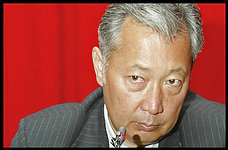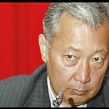
BAKIYEV’S NEW GOVERNMENT FOSTERS LARGE-SCALE CORRUPTION
Publication: Eurasia Daily Monitor Volume: 4 Issue: 28
By:

Kyrgyzstan’s recently appointed Prime Minister Azim Isabekov formed a new government this week. The changes made by Isabekov suggest that he largely followed directions from Kyrgyz President Kurmanbek Bakiyev and his deputies. The new government excludes some former popular political leaders and increases the powers of Bakiyev’s closest allies.
With Isabekov having limited political capital, Bakiyev now bears full responsibility for the new government’s performance. His recent reappointments suggest that the president is constructing a network of loyal subordinates to increase his own leverage against the parliament. The reappointed first deputy prime minister, Daniyar Usenov, is currently among the strongest pro-presidential figures in Bishkek. The CEO of Kyrgyzgas, Igor Chudinov, and the CEO of Elektricheskie stansii, Saparbek Balkibekov, will head a new Ministry of Industry, Energy and Fuel Resources (Akipress, Parohod.kg, February 6).
Bakiyev has been criticized for inflating the size of the public sector by maintaining too many ministries and committees. Currently there are 14 ministries and 17 committees and agencies in the Kyrgyz government. As Bely parohod pointed out, Bakiyev’s closest relatives have a role in his cadre policies (February 6). Among them, the president’s brother Zhanybek Bakiyev, former deputy chair of the National Security Service, plays a key, albeit hidden role (24.kg, February 7, see EDM, January 18).
The new group of governmental appointees will secure the continuity of the existing corrupt structure of Kyrgyzstan’s energy sector, banking system, and customs control. All of these sectors are controlled by public officials or people allied with the government. Under state protection, each sector conducts business by assisting the others with financial or political support.
The new government is likely to reject Kyrgyzstan’s prospective joining of the Heavily Indebted Poor Countries (HIPC) Initiative. Parliament Speaker Marat Sultanov explained to Jamestown that HIPC will not solve the problems in Kyrgyzstan’s energy sector, but would make the country even more dependent on international financial institutions. However, according to one World Bank employee, some top Kyrgyz officials oppose reforms in the energy sector because it would threaten a major source of corruption. Few of these officials were involved in the government’s recent reshuffle. According to various estimates, key managers and government officials in this sector annually pocket about $30 million (see EDM, September 27, 2006).
But while Bakiyev’s new government is rejecting the HIPC, it is not capable of designing any alternative strategy to reduce Kyrgyzstan’s $2 billion external debt. Bakiyev’s behavior is driven by short-term needs instead of trying to secure more stable economic development. In this sense the president is repeating the mistakes of his predecessor, Askar Akayev, who was responsible for accruing the current external debt and ineffectively managing Kyrgyzstan’s gold reserves and the energy sector. The Kyrgyz government’s negligent treatment of the HIPC worsened its relations with both the International Monetary Fund and the World Bank. On February 7 both organizations released a letter emphasizing that joining the HIPC is in Kyrgyzstan’s long-term economic interests.
Today, Kyrgyzstan’s economy is sustained largely by remittances from labor migrants mainly residing in Russia, Kazakhstan, Europe, and the United States. Kyrgyz civil society activist Edil Baisalov recently commented that Kyrgyzstan is simply “doomed” regarding economic growth because almost $1 billion in remittances is sent annually by the country’s “main export commodity – labor power” (Idelo.ru, February 5). However, these remittances do not pay down the external debt.
The new government will probably work towards strengthening Bakiyev’s positions before the next presidential elections in 2010. According to Sultanov, although the government is loyal to the president, the parliament is still a strong counterweight as “no other [Kyrgyz] parliament ever vetoed so many presidential decrees.” But Sultanov also jokes, “Today, none of the existing state structures enjoy the population’s full support.”
A number of Kyrgyz experts argue that the government recently tamed most opposition parliament members. Reportedly, unwanted MPs were pressured by threats to hinder their businesses.
Despite the weak government and a president seeking to increase his own powers, Kyrgyzstan still possesses multiple points of view. A number of local mass media outlets freely publish criticism against state structures and specific political actors. The government will not be able to fully curtail the activity of the local press. Yet while the accusations are made, the law-enforcement agencies do not carry out any anti-corruption activities.




